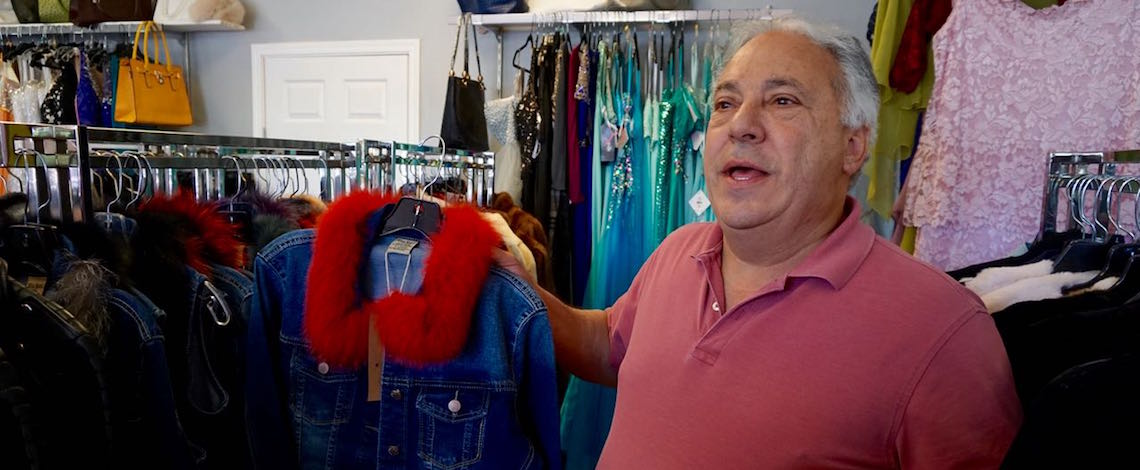
Cy Cerro, one of the managers of Malibu Fashions & Posh II in Fresno, said AB 44 would be the death knell for fur sales in California, which already face a regulatory minefield. Photo by Edward Smith
Written by
A bill proposing to effectively end the sale of new fur in California passed out of its second Senate committee recently after approval in May from the Assembly.
Assembly Bill 44 changes the fish and game code to ban the sale and manufacturing of fur throughout the state, carving out exceptions for leather, deer, sheep, goats, dogs and cats.
In response to videos depicting animal cruelty in the fur industry, Assembly Member Laura Friedman (D-Burbank) brought forth the bill in 2018 as a way to unify the California code with what four cities in the state have already done to ban animal hides, according to a spokesperson from Friedman’s office.
Elected officials in Los Angeles, San Francisco, Berkeley and West Hollywood have all passed bills banning fur within their own city limits in the past few years.
The Senate’s first hearing on the bill was held by the Natural Resources and Water Committee, where Sen. Andreas Borgeas (R-Fresno) was quoted as asking if there was “a way forward without having an outright ban…without completely undoing an industry,” according to a press release from the Fur Information Council of America.
Beginning in 2022, violators would face a first-time penalty of $500. That fine could double with subsequent offenses.
Malibu Fashions & Posh II at Marks and Bullard avenues, one of few furriers left in the Central Valley, is also one of the oldest businesses in Fresno, starting in 1895 as Normarts, according to Cy Cerro, one of the store managers.
“From the standpoint of raising the animals, they are raised very, very well,” Cerro said. “Because if you don’t raise them well, the value declines precipitously.”
Keith Kaplan, director of communications and public policy for the Fur Information Council of America, said while there may be a few bad players, the legislation would put good players out of business.
In California, the fur industry is worth $300 million annually, Kaplan said, making it the second biggest portion of a $1.5 billion industry nationwide.
Cerro said the bill would be “disastrous” for his business as well as the fur industry.
His shop sells and manufactures custom furs, with regular customers from Tehachapi to Sacramento. Normarts began in Downtown Fresno on Fulton Street, and in that time, it’s become a staple to many, he said, and it’s also not strange to see people coming from Southern California or the Bay Area.
Malibu Fashions purchased Posh Fresno in 2000 when the store was in Fig Garden Village before a move to Northwest Fresno.
“The fur industry worldwide has increased, but in California it has been much more difficult with the political environment,” Cerro said.
In the United States, Wisconsin and Utah make the first and second largest mink pelt-producing states, respectively. Pelt production in 2017 totaled 3.31 million pelts, down 4 percent from the previous year, according to the U.S. Department of Agriculture. Despite being down production-wise, the total pelts that year valued $120 million, slightly above 2016.
Minks raised in the United States have the best quality in the world for that species, Cerro said. The middle classes of Russia and China have sought out American-raised animals for their production and then sold it back to the states.
Bill proponents, including PETA, cite poor conditions for the animals and how they are harvested by methods such as electrocution.
Kaplan said that euthanization methods are determined by recommendations from veterinary doctors for each species based on least stress and shortest duration.
Those in the fur industry have gone so far as to develop a certification program called Fur Mark that sources each piece of clothing back to where it originated, similar to fair trade or organic designations. In 2003, the Kimberley Process Certification Scheme was established to prevent the selling of conflict diamonds internationally.
But some allowances such as electrocution in the Fur Mark certification have made it a non-starter in negotiations for authors of AB 44.
And while Kaplan said the certification allowances are extensive, he said that the industry could negotiate on standards.
“If they have alternative suggestions based on science, share it with us,” he said.
After passing out of the Senate Judiciary Committee Tuesday, where Sen. Borgeas got a second look at the bill, this time as vice-chair, AB 44 now stands before the Senate Appropriations Committee on its way to a general vote.








